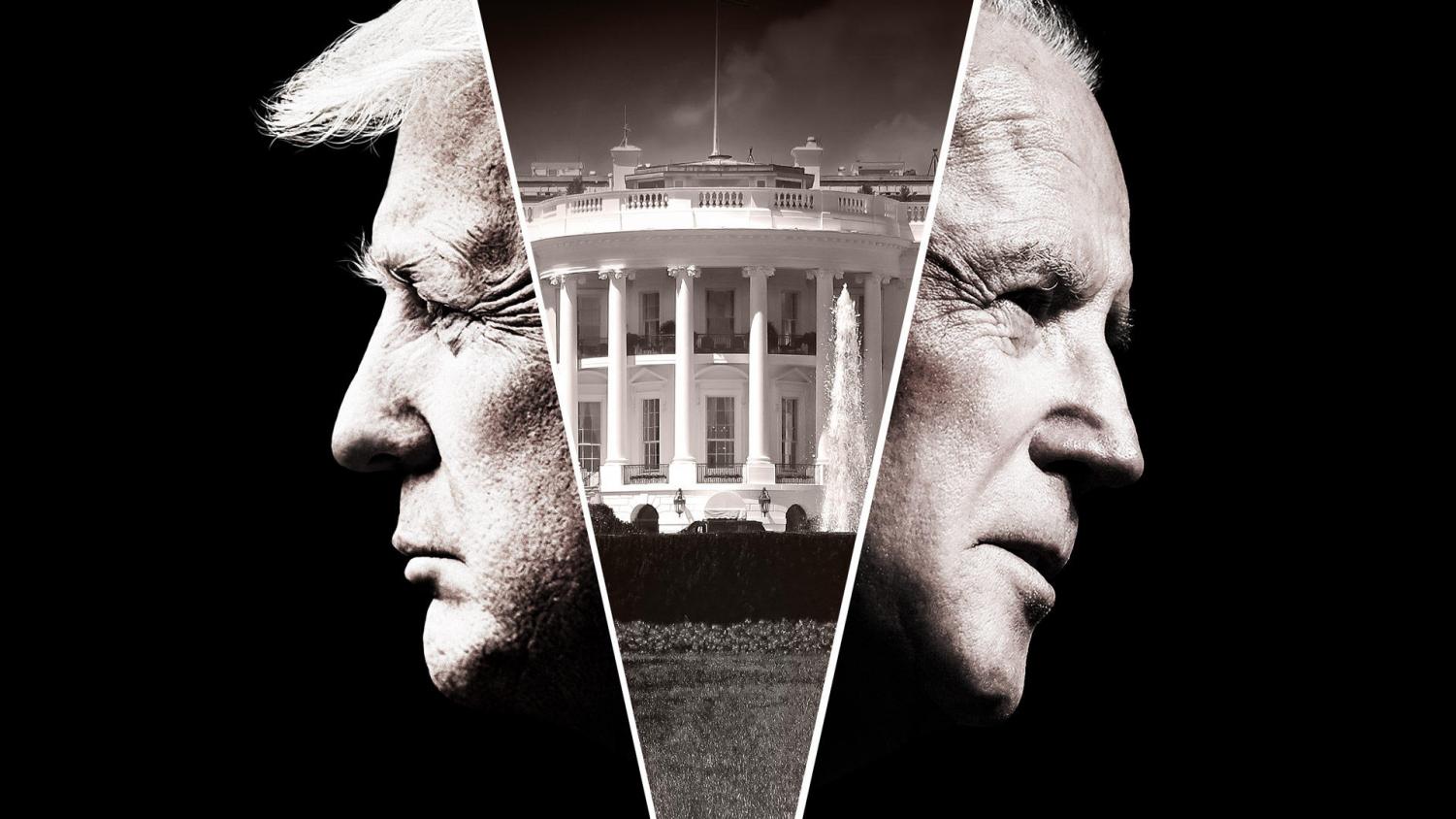And The Winner of The 2020 Presidential Election Is . . .
December 1, 2020
Well, that’s still up in the air.
On Saturday, Nov. 7, former Vice President Joe Biden was prematurely declared the winner of the 2020 presidential election, which would, essentially, make him the President-elect, and former Senator Kamala Harris, the Vice President-elect of the United States of America.
But wait, there’s more.
President Donald J. Trump accused the mail-in-ballot system in America of being flawed and corrupt. He claimed in 2016 that his supporters’ mail-in ballots were being sold by mailmen and disposed of by poll workers.
He encouraged Americans to go out and vote in person in the 2020 election and keep a close eye on the polls for potential fraud.
Trump announced that he would accept the results of the 2020 election as long as they were fair. However, he promised that if thousands of votes were fraudulent, he wouldn’t stop fighting until the final and accurate counts were completed.
“This is not going to end well,” he said.
Low and behold, supporters of Trump felt psychic powers seem not to warrant skepticism, as they believe thousands of votes have already proven fraudulent.
The Supreme Court has since been performing an ongoing investigation of the alleged ballot corruption, which will delay the official results of the 2020 Presidential Election.
On Nov. 30, Wisconsin and Arizona became the last of six states that Trump contested to finalize their vote counts for Biden. The Electoral College will meet on Dec. 14. Trump states he will continue to pursue legal action and will not concede. Biden is projected to be ahead by a count of 306-232.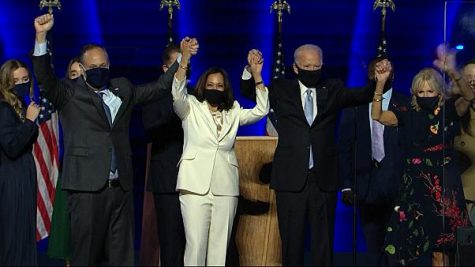
On the Importance of Voting
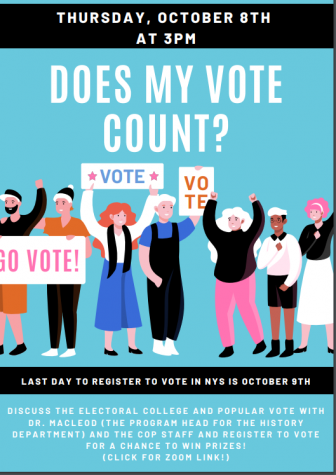
Even while enduring the pandemic, Mercy College continued to push young people to vote. Amongst other similar events during this election season, the school held a virtual Zoom event titled: “Why Does My Vote Count?” where History Program Director and Assistant History Professor Dr. Maureen MacLeod educated students about the importance of voting, both on a local and national scale.
Luis Rodriguez, a staff member at Mercy College, agreed about the importance of voting in all elections, not only presidential.
“Our votes count the most in the local elections. Media only covers the presidential elections, so I subscribe to email newsletters to receive my information,” he said. “Otherwise, you have to rely on Google to see the different candidates and the policies they represent.”
He feels that finding information about candidates is much more difficult on the local level because many of the elections can seem predetermined. For example, there might be no one running against a judge this year in Dobbs Ferry, making his race to victory a shoo-in win.
Presidential elections are always fact-checked, while local elections don’t necessarily have the resources for fact-checking.
“Candidates can say anything. How do we know what we’re finding online is factual or not?” Rodriguez asked. “That is daunting for many young candidates in picking the right person to vote for.”
For young people who share this point of view: unsure if candidates’ information is factual and what their plans are, there is a website called www.vote411.org. This site is dedicated to giving people all the information they might need about voting on every governmental level, as well as insightful breakdowns of candidate policies and plans.
MacLeod explained the importance of young voters exercising their rights.
“One issue that is not focused on enough is that if everyone, 18 to 40, voted, they would decide every election because of the sheer size of that population. It’s amazing to think about,” she explained.
As a historian, she often looks back and wonders how changes are made. She firmly believes that unless people voice their wants and needs, change will seldom be possible.
“You must remember that your vote will allow for things to change. It has to start at the local level and work its way up,” MacLeod said. “You have to be vocal and you have to represent what you want. You can’t just complain. Nothing happens when you complain.”

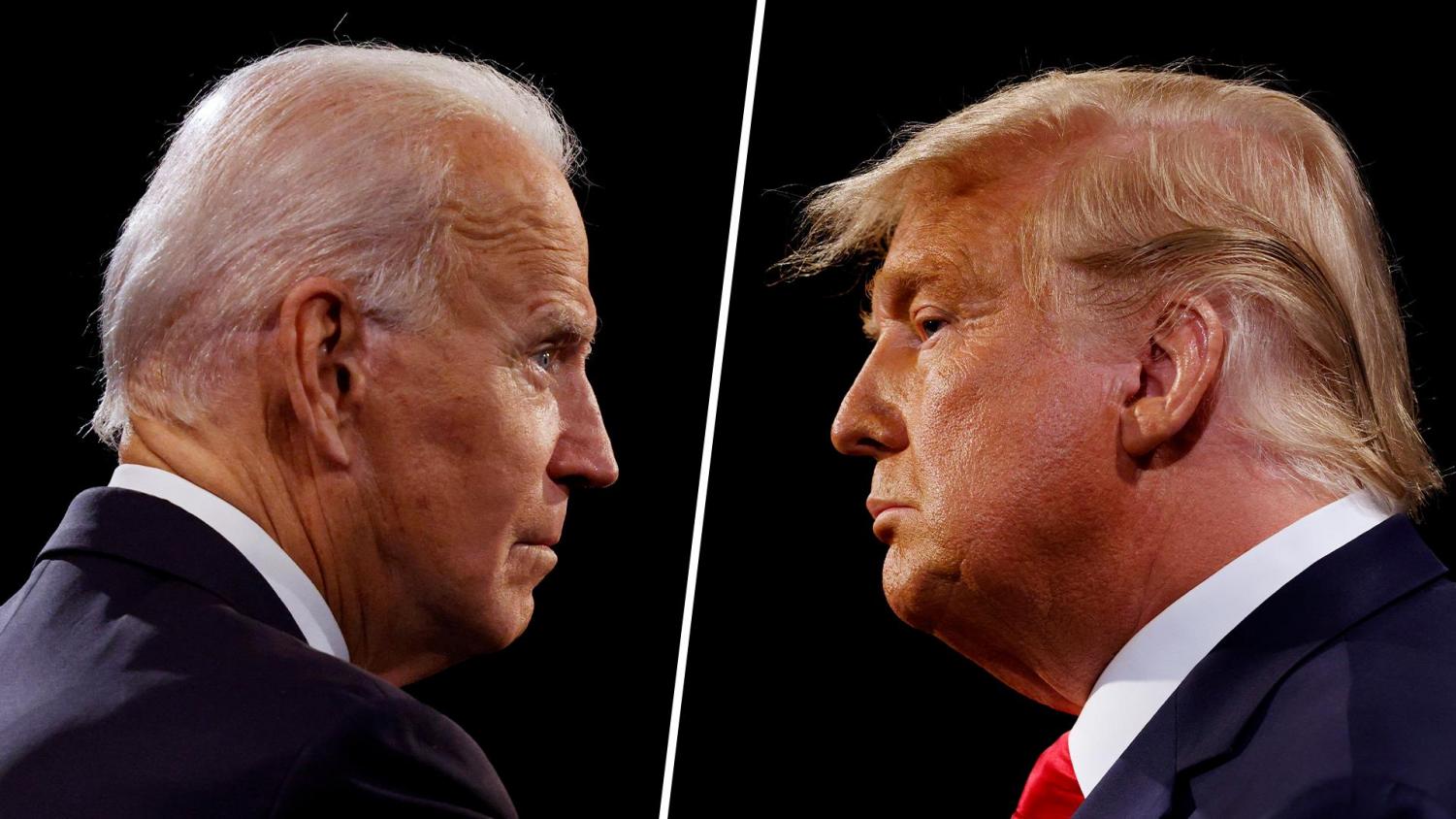
On Debates
There are usually four debates that take place prior to a presidential election, three of which are between presidential candidates: in this case, Trump and Biden, and one between vice presidential candidates: in this case, Vice President Mike Pence and Harris.
Trump and Biden squared up on Sept. 29 at Case Western Reserve University in Cleveland, Ohio, for the first in what was supposed to be a series of three presidential debates. The debate was moderated by Fox News’s Chris Wallace, and consisted of the Trump and Biden records, The Supreme Court, COVID-19, the economy, race and violence in American cities, and the integrity of the election.
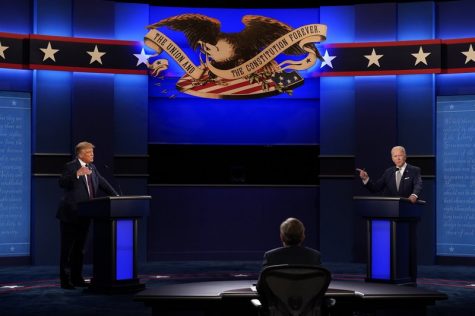
On Oct. 7 at the University of Utah in Salt Lake City, Utah, Harris, Pence, and his pet fly went head-to-head (no pun intended), in the vice presidential debate. The topics of focus were COVID-19, jobs and the economy, healthcare, climate change and the environment, policing in America, and voting. USA Today’s Susan Page was the moderator.
The two stuck to the guns of their presidential candidates while discussing the topics they were presented with. Their ability to remain civil made the debate ‘fly’ by much quicker than the presidential debates.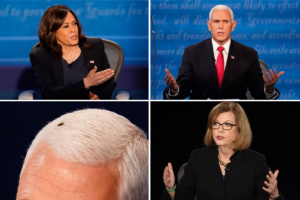
The second debate was originally scheduled for Oct. 15 in Miami, Florida. However, Trump tested positive for COVID-19 and organizers canceled the debate, leaving potential voters with only two presidential debates to influence their decisions.
NBC News’s Kristen Welker moderated the second and final presidential debate on Oct. 22 at Belmont University in Nashville, Tennessee. Trump and Biden faced-off over the topics of the fight against the coronavirus, national security, American families, race in America, climate change, and leadership.
During the debates, each candidate was allotted two minutes, uninterrupted, at the beginning of each section, to respond to the moderator’s question regarding one of the six pre-decided debate topics per section. Then, each was given 30 seconds to respond to the other after they’d given their answer to the initial question.
Though a lot of head-butting and interrupting took place during said debates, and the time allowance for questions and responses was seldom respected, there were some important takeaways from each.
***
In an interview with Prof. Frederick L. Shiels, a seasoned political science professor at Mercy College, he shared his opinion and highlights from the first presidential debate.
“I’ve watched every presidential debate since 1960, so I have a pretty big store of debate experience, but this one was unique.”
He explained how the entire debate was erratic with the moderator, Trump, and Biden all losing control sporadically.
“The accomplished Biden strategically lost his temper and gained it back. He showed his humanity by calling Trump a clown and telling him to shut up, but also showed his maturity by being able to quickly collect himself.”
Shiels saw Biden as smoother than the “angry and macho” Trump and agreed with initial cable reactions that showed Biden won the debate.
Paraphrasing a theory from former U.S. Secretary of Labor, Robert Reich, Shiels explained the current state of the Republican and Democratic parties.
“Democrats have become the Ramen class: wise, professional, techy, and engineering. The Republicans are more of the commercial class: real estate, wall street people.”
Unbeknownst to this paradigm, the debate gave him the impression that Trump’s political luster is fading.
Twitter users also had a lot to say about the presidential debates. It has been a warzone of contrasting opinions.
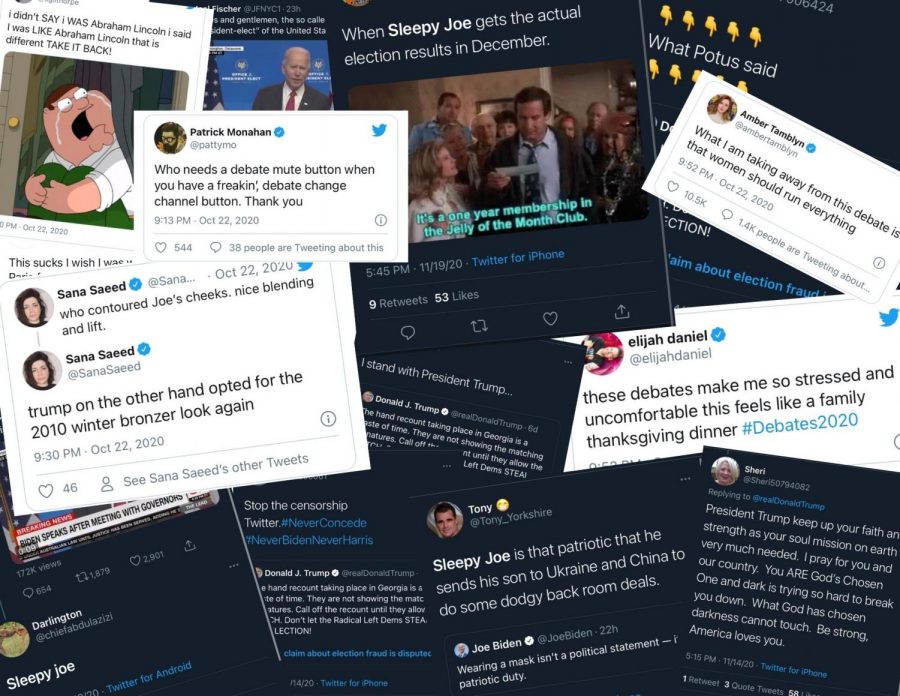
Since Trump has become involved in politics, people, including those from other countries, have been more outspoken than ever before, especially on social media. Many have the tendency to get engulfed by theatrics and lose sight of what an election is all about. It’s the duty of the people to make an organized and informed choice of the candidate that they believe will better serve their country. Beneath the media-fueled popularity contest of who yells the loudest or makes the wittiest remarks, struggling to breathe are the platforms, policies, and beliefs that each candidate plans to implement during their term as POTUS.
On COVID-19, Leadership, and the Economy
More than 40,000 Americans were in the hospital with COVID-19 on the night of the final debate, including record numbers in Tennessee, where the debate was held. Between the first and final debates, 16,000 Americans died from COVID-19.
Each candidate was asked what their plans are for maintaining the trust of the American people while leading the country through the unpredictable conditions of the pandemic.
Their vastly different viewpoints spanned from the virus itself and who is to blame for it, to the ongoing lockdowns, vaccinations, and what plans are in place to continue economic recovery.
Trump spoke about the fact that the virus was expected to cause 2.2 million deaths in the United States alone.
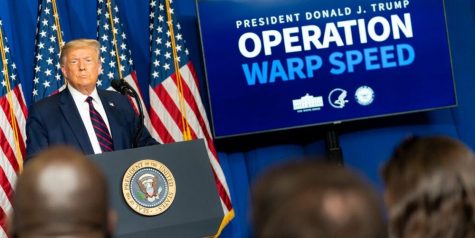
He proclaimed that Operation Warp Speed has a COVID-19 vaccine in the works. He plans for 100 million vials to be released and distributed by the military before the year concludes. In addition, the efficient production and distribution of personal protective equipment and ventilators throughout the beginning stages of the pandemic has further strengthened his confidence that the end is in sight.
Trump stands firmly on the grounds that he has built the strongest economy in American history. Now, as the country is being reformed to where he’d brought it before the pandemic, a record number of people have already returned to work: 11.4 million in a short period of time.
People of all different ethnicities, employment statuses, and political views expressed their desire to unify under Trump’s leadership. It was COVID-19 that halted this breakthrough, and he believes the progression will continue once the pandemic subsides. He wants to reopen the country entirely in order to return it to its successful functioning state, while continuing to follow social distancing and mask-wearing mandates.
The lockdowns had a major psychological effect on the American people with rises in drug abuse, depression, and skyrocketing divorce rates. Trump believes that Biden’s stance on continuing lockdowns in states with high numbers of COVID-19 cases is further hurting not only mental health but the economic recovery of the country as well.
Biden expressed his fear of the virus overstaying its welcome far longer than Trump expects. He exclaimed that the country can not entirely open back up until the virus is dealt with. He then proceeded to focus on his thoughts on Trump’s handling of the crisis thus far.
He believes Trump has no intention of increasing the health and safety of people in America, and that he has neglected giving schools proper equipment to reopen, forcing them to shut back down.
He also feels that there has been a lack of funding for small businesses, causing many to close their doors for good. He wants the country to open slower because he believes it is the safer alternative.
According to Biden, Trump was aware of the severity of COVID-19 in February of 2020 and chose not to take immediate action because he worried the American people would panic.
“You don’t panic. He panicked.”
Biden plans to invest in rapid testing, enforce constant mask-wearing, and set up national standards for opening schools and businesses safely – and aid them financially to do so.
His prediction entails the country facing a “dark winter.”
According to the CDC, before the new coronavirus strain appeared in China, it had never been seen before. It quickly traveled across the globe and gained the attention of scientists and world health organizations. All the while, Biden placed the blame on Trump.
“Anyone who is responsible for that many deaths should not remain as President of the United States of America.”
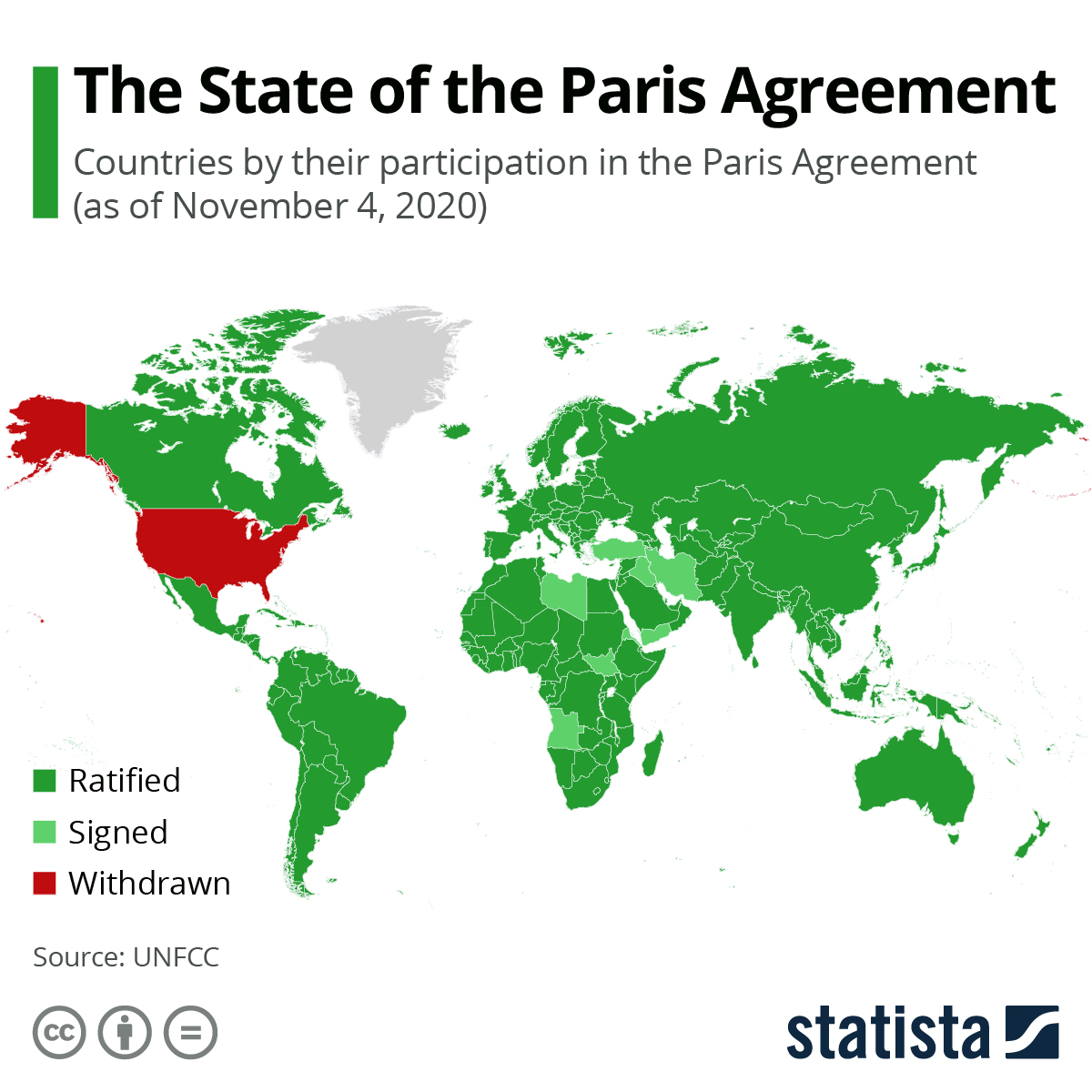
On Climate Change
One of the most commonly asked questions during the election season was how each candidate would combat the issue of climate change while keeping in mind the importance of protecting existing jobs and creating new ones.
Trump views environmental regulations as harmful to jobs in the energy sector while Biden sees addressing climate change as an opportunity to create new jobs.
Trump said that amongst many different programs, he locked in America’s commitment to environmental conservation by joining the Trillion Trees Initiative. He expressed his love for the environment and his want for the most crystal-clear water and the cleanest air. He also mentioned that the U.S. has the lowest number of carbon emissions for the first time in 35 years under the Trump Administration.
Biden shared his $2 trillion dollar plan to make four million buildings carbon emission friendly during his first term, turning America into a completely carbon-free country by 2035. He repeatedly defended that his plan to combat climate change is separate from the Green New Deal.
He disagreed wholly with Trump and said that he feels that the United States needs to rejoin the other 190 countries in the Paris Accord immediately, as the world is nearing the “point of no return.” He referenced the wildfires in Brazil as a direct consequence of Trump ceasing participation with the accord.
Trump explained that his refusal to participate in the Paris Accord was done to prevent the American coal and oil industries from diminishing, upon which millions of jobs and companies rely. He accused the Biden campaign of wanting to completely abolish fracking.
Trump has continuously questioned the legitimacy of Biden’s plan on the basis of the lack of action taken while he was in office beside former President Barack Obama.
“So why didn’t he do it for 47 years? You were vice president. Why didn’t you get the world—China sends up real dirt into the air. Russia does, India does, they all do.”
Biden claimed his plan is rock solid. He promised a plan to slowly stop fracking and eventually switch over to natural gas as the only source of energy.
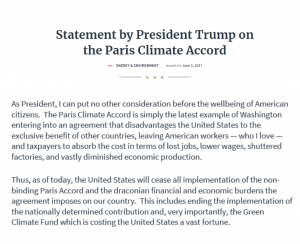
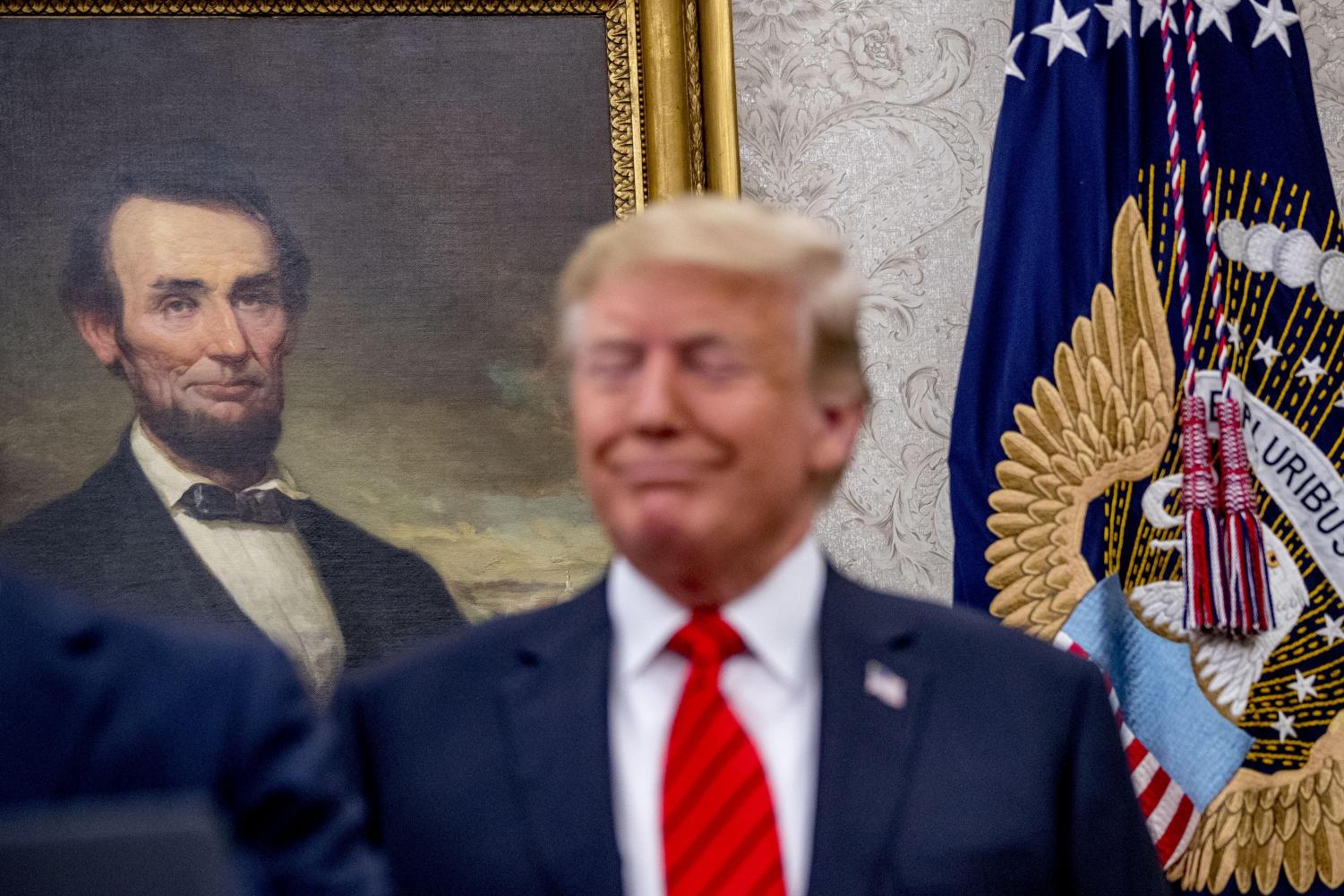
On Race in America
Under the umbrella category of racism, the two candidates were often asked to speak directly to the families who are allegedly targeted by police and others and fear for their children solely because of the brown or black pigment in their skin.
Trump repeatedly extended sympathy and understanding.
“With the possible exception of Abraham Lincoln, no one has done for the black community what Donald Trump has done,” he said, referring to himself in the third person.
He stood firm in his belief that his relationships with all kinds of people prove that he is far from racist, despite what some Americans might think. He went on to support his claim with mention of having taken care of criminal justice and prison reform, black colleges and universities, and opportunity zones with 10-year long-term funding during his presidency.
Trump said that the first time he had ever even heard of the Black Lives Matter movement, it was while they were chanting public defamations about police officers such as: “Pigs in a blanket! Fry ‘em like bacon!” His first impression of the movement was that it was a terrible thing; a symbol of hate. Ironically following this, he was accused of contributing to a climate of hate and racial strife himself, and his reason for explaining his first encounter with BLM was to defend his own honor in that regard.
Trump sees the violence that ensued in major cities across the country as being initiated from left-wing extremist groups rather than right-wing groups. The death of George Floyd, Breonna Taylor, and countless others led initially peaceful protestors onto city streets to march against police brutality and injustice. These rallies later became violent, causing the destruction of many stores, restaurants, and small businesses – including those owned by black-Americans.
Trump announced that the country must take action against Antifa and the left before the rioting and looting get completely out of control. He refused to condemn the white supremacists in this instance, stating the riots were coming from a place of leftist extremism.
However, Trump has blatantly denounced the Ku Klux Klan, neo-Nazis, and white supremacy many times, calling them “repugnant” to America.
Trump believes that Biden does not actually believe in law and order, and lacks the will to send the national guard into cities to stop ongoing violent protests throughout the country. He called Biden out for referring to black-Americans as “super predators” in the past, and again, his lack of action as Vice President during the Obama Administration.
Trump rationalized the ending of racial sensitivity training because, in his opinion, the nature of the program is racist. He said the government pays hundreds of thousands of dollars for a system that encourages people to hate America. The training of police officers to treat black-Americans differently than the rest of the American citizens is a racist sentiment in itself.
He continues to confirm his strong belief in law and order and that many of the top cities in America are run by radical left democrats.
Biden agreed with the sentiment of systemic racism and injustice existing throughout the country. He said that all black people, regardless of their income or social status, are victims. He mentioned that the country had continued moving closer and closer to treating every person equally but took a backspin during Trump’s presidency.
He believes that Trump is a racist that continues to divide the nation with irreverent acts such as breaking up a peaceful BLM protest to pose for a photo op in front of a church.
After a Ku Klux Klan attack in Charlottesville, Virginia, Trump’s comment referring to them as: “fine people on both sides,” Biden considered: “horrible beyond what any president has ever done before,” rather out of context as Trump explained that just as there were some fine people, there was also blame on both sides.
Biden has expressed that most police officers are good people, but there are always “bad apples in the bunch.” He wants to band groups from all over the country and bring them to the White House to work out a way to hold criminal police officers more accountable for their crimes.
“Americans are one,” he said. “And this is the only way to bring the country together. Violence in response [to these issues] is never appropriate.”
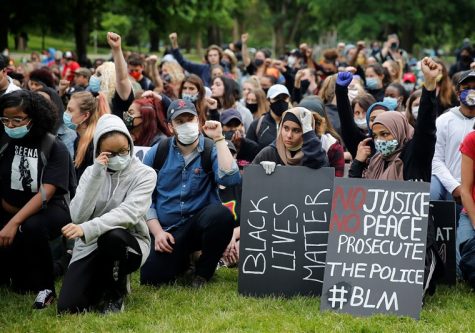
Biden advocates for more assistance to law enforcement, not defunding the police: a system of law and order where all people are treated fairly.
In his exact words: “I never had to tell my daughter if she’s pulled over make sure she puts, for a traffic stop, put both hands on top of the wheel and don’t reach for the glove box because someone might shoot you.”
He continued: “But a Black parent, no matter how wealthy or poor they are, have to teach their child when you’re walking down the street, ‘don’t have a hoodie on when you go across the street,’ making sure you in fact, if you get pulled over, ‘yes, sir,’ ‘no, sir,’ hands-on top of the wheel because you are, in fact, the victim whether you’re a person making $300,000 a year person or someone who’s on food stamps.”
He made clear his opinion that America is troubled with institutional racism.
He didn’t miss his chance to respond to his opponent with a certain air of diatribe: “Abraham Lincoln here is one of the most racist presidents we’ve had in modern history.”
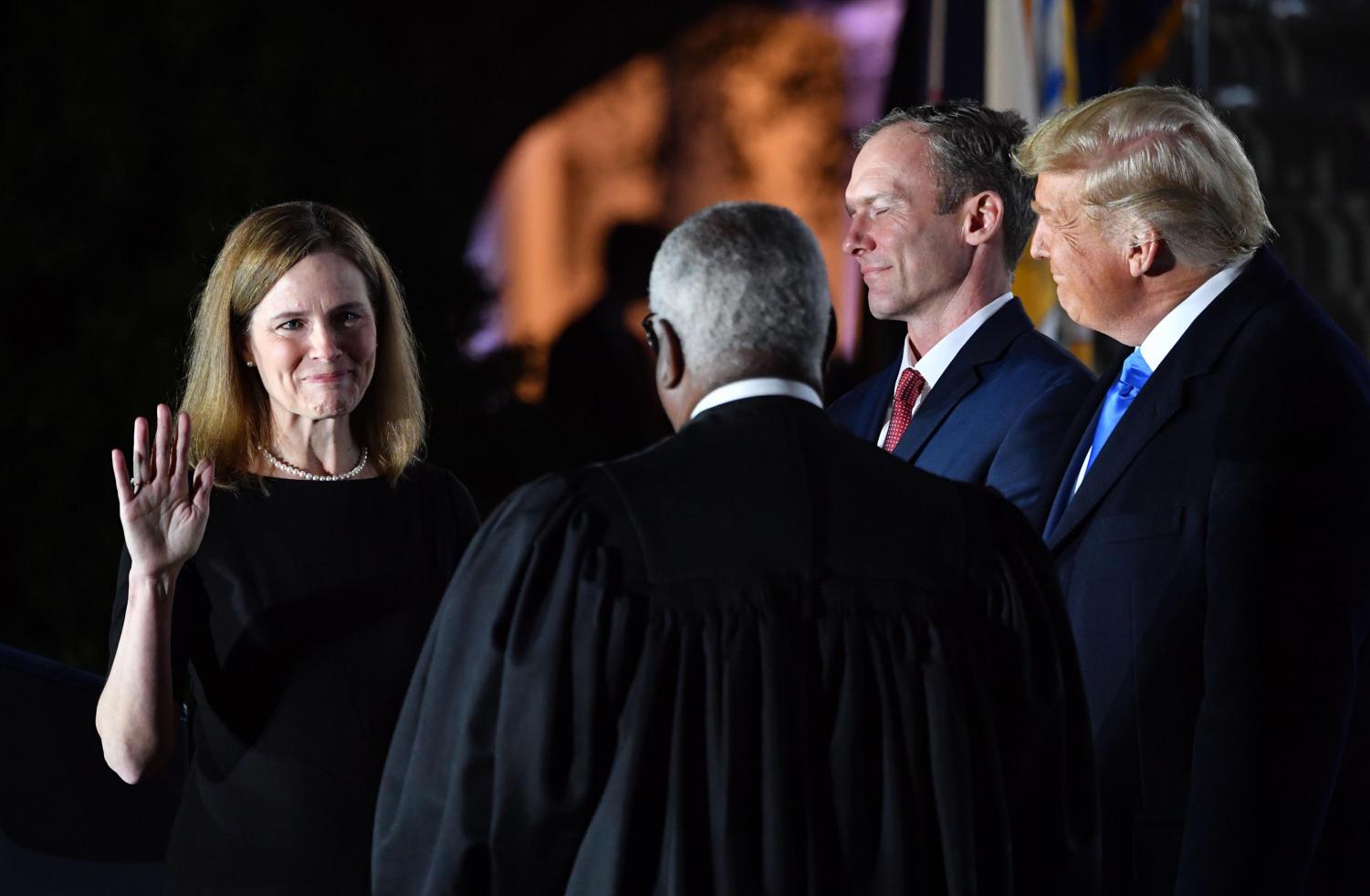
On Healthcare and the Supreme Court
Former Judge Amy Coney Barrett officially replaced the late Ruth Bader Ginsburg as Associate Justice of the Supreme Court by Trump’s nomination on Oct. 27.
Trump, with Senate approval, appointed the judge to the empty seat because the vacancy occurred during his presidency. He praised Barrett for her academic achievements and was proud to appoint her to the highest United States court.
Her stance will give Republican ideals a 6-3 majority in the Supreme Court.
Biden felt it inappropriate for Trump to appoint a justice shortly before a presidential election and worried that the appointing of Barrett would unbalance the courts. He mentioned her rumored viewpoints to help overturn Roe v. Wade. Making the law unconstitutional would take away a woman’s right to have an abortion.
Biden’s disapproval of Barrett continued with her viewpoints on healthcare which align with Trump’s plan to overturn the Affordable Care Act (Obamacare).
Over 20 million Americans receive their health insurance through the Affordable Care Act. The Trump Administration is advocating for the Supreme Court to overturn it.
Trump brought up that by terminating the individual mandate, which required them to pay pricey amounts for the privilege of not having to pay for “bad” health insurance, he already benefited the American people.
He explained his plans to get rid of Obamacare and offer a brand new, “much better” health insurance, still with no individual mandate, that will always protect people with preexisting conditions. If his new plan falls through, he said he will then bring an even better version of the ACA back.
Trump also plans to lower drug prices and mentioned that Biden could have lowered drug prices during his 47 years in government but chose not to.
Biden claims that Trump has no concrete plan and only provides the American people with wishful thinking and empty promises. His plan is to pass Obamacare with a public option and call it “Bidencare.” The public option means that if one qualifies for Medicaid but does not have the wherewithal in their state to get Medicaid, they will automatically be enrolled in Bidencare. Within this, he plans to reduce premiums and drug prices.
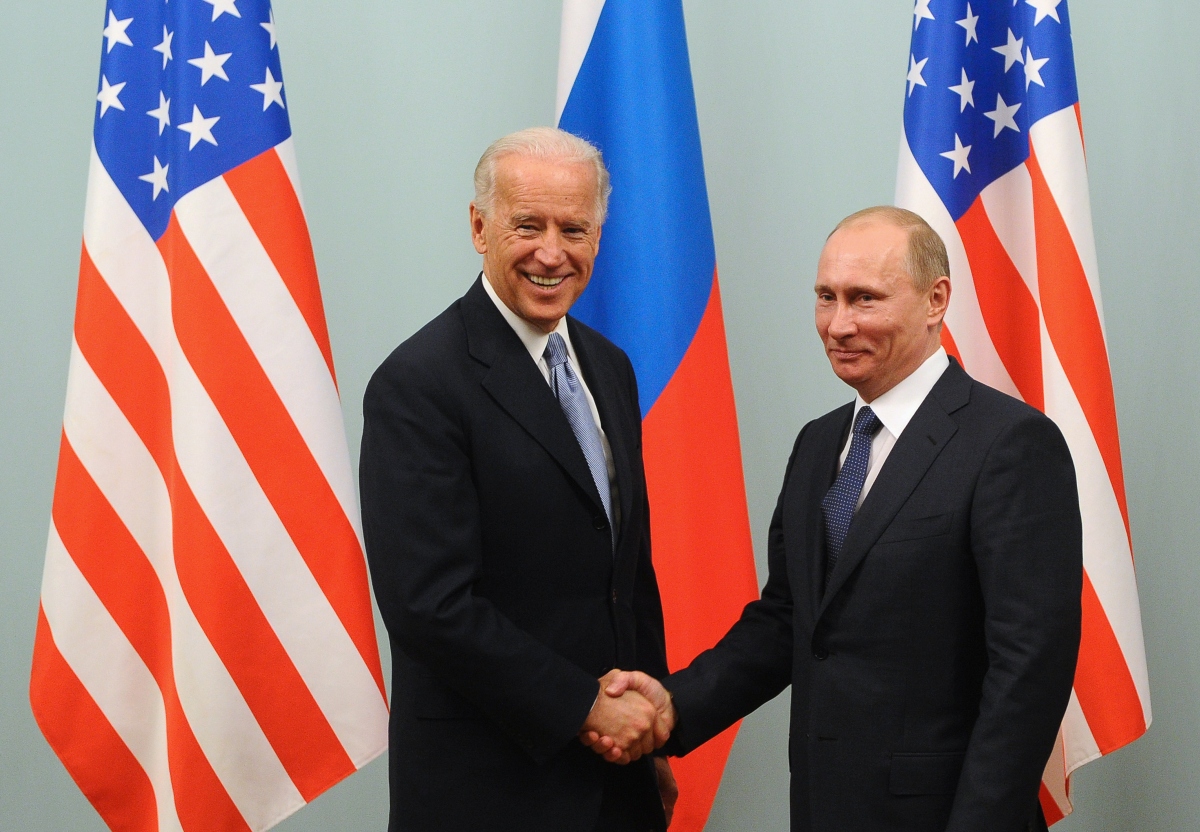
On the Trump and Biden Records and National Security
Biden believes that Trump took advantage of broken tax codes and profited during his presidency while America became weaker and more divided. He plans to eliminate a portion of Trump’s tax cuts.
Trump disclosed that he pays millions of dollars in taxes every year. In fact, he mentioned that Biden passed a tax bill years before that had helped him.
“Putin’s puppy,” as Biden refers to Trump, and other billionaires, have only become wealthier while the middle and lower class are worse off than before, he feels.
Trump brought up that Biden and his family accepted $3.5 million from Russia through Putin and that they continue to accept money without any explanation as to why.
He talked about the bad that was done by Russia during Biden’s term with Obama and how much the two handed over to Russia while accepting money from them then, as well.
On the topic of family, he also shared that Biden’s son, Hunter, was “administratively” discharged from the military for drug use.
Biden wasn’t happy that Trump initiated a conversation about his family, but explained how proud he is of his son for recovering from his drug addiction.
He elaborated further, saying that his is not the only family at stake, as this is about the families of the American people.
The night before the final presidential debate, top intelligence officials confirmed that both Russia and Iran were working to influence the election. They’d obtained U.S. voter registration information, and Iran sent intimidating messages to Florida voters.
Biden said during the debate that he intends to make Russia, China, Iran, and any other countries that interfere with the U.S., pay for affecting the country’s sovereignty and for trying to ensure that he would not be elected the next President of the United States.
He claims that Trump is unwilling to take on Vladimir Putin even though he paid to have American soldiers killed in Afghanistan and attempted to destabilize NATO, and he questioned why Trump hasn’t done anything to stop it.
Trump quoted Director of National Intelligence, John Ratcliffe, in saying that “The one thing that’s common to both of them [Biden and Putin], is that they both want you [Trump] to lose because there has been nobody tougher on Russia.”
Trump said he has gotten the NATO countries to put up an extra $130 billion, soon to be $420 billion, each year, to guard against Russia.
“In 47 months, I’ve done more than you have in 47 years, Joe,” a comment Trump frequently makes.
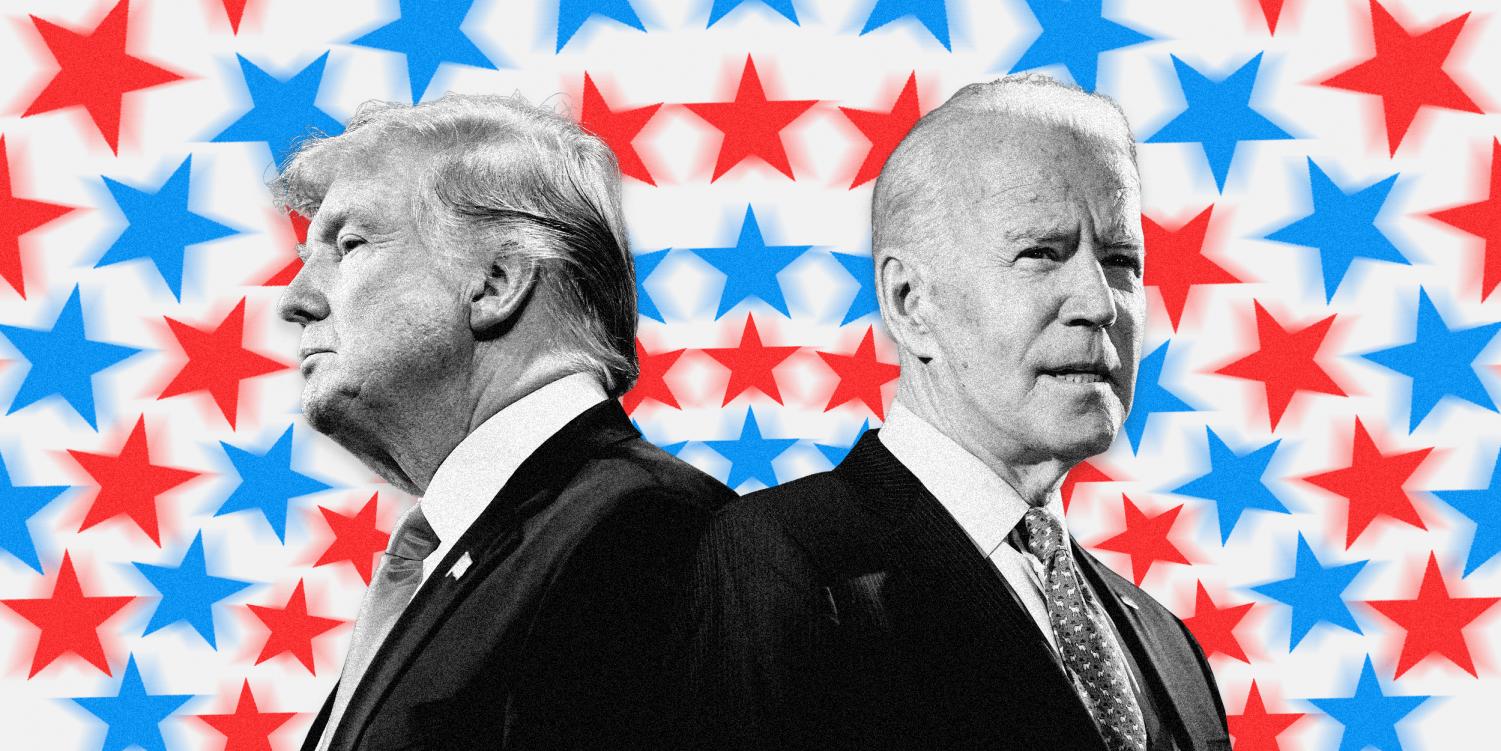
What’s Next?
Don’t worry, the Impact will continue following the post-election process and adding updates as seen fit.
An additional section on “Challenging the Election” is coming soon, so stay tuned.
For now, we simply wait.
